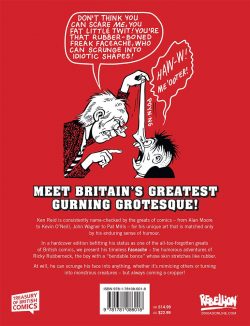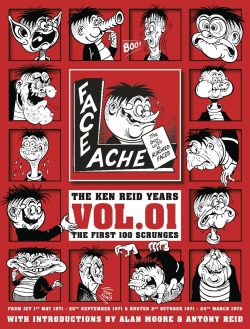

By Ken Reid, with Ian Mennell & various (Rebellion Studios)
ISBN: 978-1-78108-601-8 (HB/Digital edition) 978-1-78108-865-4 (TPB)
Time flies and it’s not long to Halloween now, so if you need a bit of practise making scary faces to extract sweets from suckers, here’s a classic “how-to” manual to get you back up to speed…
If you know British Comics, you’ll know Ken Reid. He was another of those youthful yet rebellious artistic prodigies who, largely unsung, went about transforming British Comics: entertaining millions and inspiring hundreds of those readers to become cartoonists too.
Reid was born in Manchester in 1919 and drew from the moment he could grasp an implement. Aged nine, he was confined to bed for six months with a tubercular hip, and occupied himself with constant scribbling and sketching. Ken left school before his 14th birthday, winning a scholarship to Salford Art School, but never graduated. He was, by all accounts, expelled for cutting classes and hanging about in cafes…
Undaunted he set up as a commercial artist, but floundered until his dad began acting as his agent.
The big break was a blagger’s triumph. He talked his way into an interview with the Art Editor of the Manchester Evening News and came away with a commission for a strip in its new Children’s Section. The Adventures of Fudge the Elf (Stop it! It’s not that sort of strip) launched in 1938 and ran until 1963, with only a single, albeit lengthy, hiatus from 1941 to 1946 when Reid served in the armed forces.
From the late 1940s onwards, Reid dallied with comics periodicals: his work (Super Sam, Billy Boffin, Foxy) were published in Comic Cuts and with submissions to The Eagle, before a fortuitous family connection (Reid’s brother-in-law was Dandy illustrator Bill Holroyd) brought DC Thomson managing editor R.D. Low to his door with a cast-iron offer of work.
On April 18th 1953 Roger the Dodger debuted in The Beano. Reid drew the feature until 1959 and created numerous others including the fabulously mordant doomed mariner Jonah, Ali Ha-Ha and the 40 Thieves, Grandpa and Jinx among many more.
In 1964, Reid and fellow underappreciated superstar Leo Baxendale jumped ship to work for DCT’s arch-rival Odhams Press. This gave Ken greater license to explore his ghoulish side: concentrating on comic horror yarns and grotesque situations in strips like Frankie Stein, and The Nervs in Wham! And Smash! as well as more visually wholesome – but still strikingly surreal – fare as Queen of the Seas and Dare-a-Day Davy.
In 1971, Reid devised Face Ache – arguably his career masterpiece – for debuting weekly Jet. The hilariously horrific strip was popular enough to survive the comic’s demise – after a paltry 22 weeks – and carried over in a merger with stalwart periodical Buster where it thrived until 1987. During that time, Reid continued innovating and creating in a horde of new strips like Creepy Creations, Harry Hammertoe the Soccer Spook, Wanted Posters, Martha’s Monster Makeup, Tom’s Horror World and a dozen others.
Reid died in 1987 from the complications of a stroke he’d suffered on February 2nd, whilst at his drawing board, putting the finishing touches to a Face Ache strip. On his passing the strip was taken over by Frank Diarmid who drew until its cancelation in October 1988.
The astoundingly absorbing comedy classic is a perfect example of resolutely British humorous sensibilities – absurdist, anarchic and gleefully grotesque – and revolves around a typically unruly and unlovely scrofulous schoolboy making great capital out of a unique gift, albeit often to his own detriment and great regret…
Ricky Rubberneck early discovered an appalling (un)natural ability of scrunching (or “scrungeing”) up his face into such ghastly contortions that he can revolt, disgust and terrify anyone who gazes upon him. Over weeks and years, the modern medusa works hard to polish his gifts until his foul fizzog may attain any formation. Eventually his entire body can be reshaped to mimic any creature or form, real or imagined. Naturally, he uses his powers to play pranks, take petty vengeances, turn a temporary profit, deal with bullies and impress his pals.
Just as naturally, those efforts frequently result in the standard late 20th century punishments being dealt out by his dad, teachers and sundry other outraged adults…
Now available in paperback, hardback and digitally this initial celebration is part of Rebellion’s ever-expanding Treasury of British Comics: collecting all 22 Jet episodes (from May 1st to September 29th 1971, plus the remaining 78 weeks’ worth from Buster & Jet, beginning with October 2nd and concluding with March 24th 1973.

The potent package is garnished with an appreciative Introduction by Alan Moore – ‘The Unacceptable Face of British Comics’ – a fondly intimate reminiscence in Antony J. Reid’s ‘My Father Ken Reid’ and a full biography of the great man…
What follows is an outrageous outpouring of raw cartoon creativity as Reid, writing and drawing with inspired effulgence, spins a seemingly infinite skein of comedy gold on his timeless theme of a little boy who makes faces at the world.
Weekly deadlines are a ferocious foe however, and a couple of strips reprinted were written by unsung pro Ian Mennell, whilst – between January & September 1972 – an uncredited fill-in artist (possibly Robert Nixon?) illustrated 16 episodes, presumably as Reid’s other commitments such as Jasper the Grasper, The Nervs or his numerous funny football features in Scorcher & Score mounted.
In these pages though, the accent is on madcap tomfoolery as our plastic-pussed poltroon undergoes a succession of fantastic facial reconfigurations: terrifying teachers, petrifying posh and pushy landowners, mimicking monstrous beasts, outraging officious officialdom and entertaining an army of schoolboy chums and chumps.
Orchards are raided, competitions are entered, plays and school trips are upstaged and aborted and even actual spooks and horrors are afforded the shocks of their unlives as Face Ache gurns his way through an endless parade of hilarious hijinks.
These cartoon capers are amongst the most memorable and re-readable exploits in all of British comics history: smart, eternally funny and beautifully rendered. This a treasure-trove of laughs that spans generations and deserves to be in every family bookcase.
© 1971, 1972, 1973 & 2017 Rebellion Publishing Ltd. Introduction © Alan Moore. Face Ache ™ & © Rebellion Publishing Ltd. All Rights Reserved.
